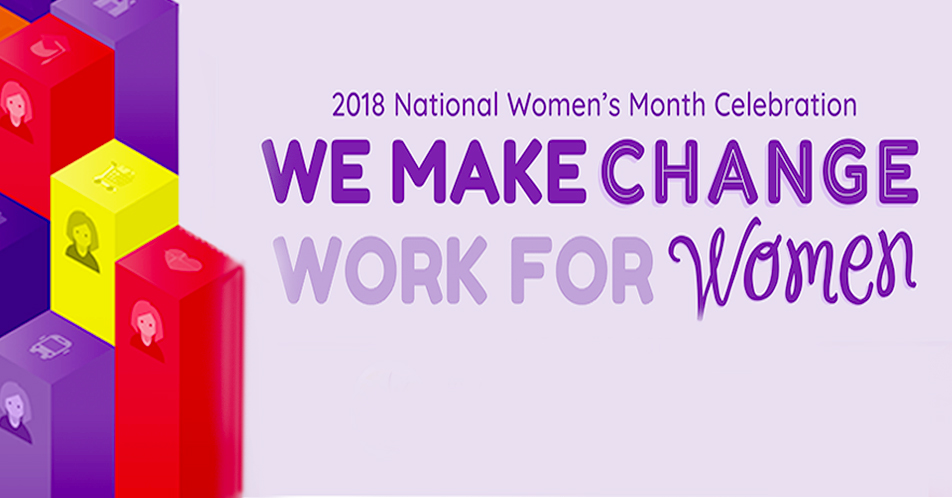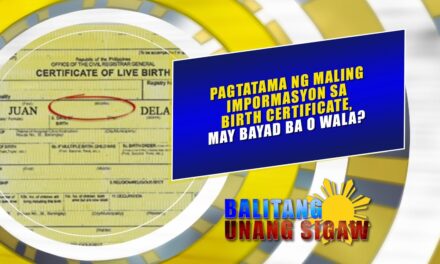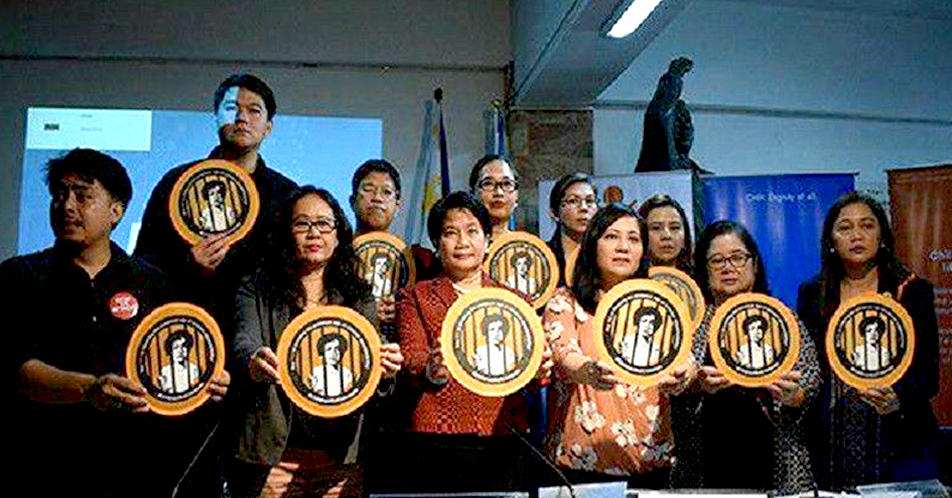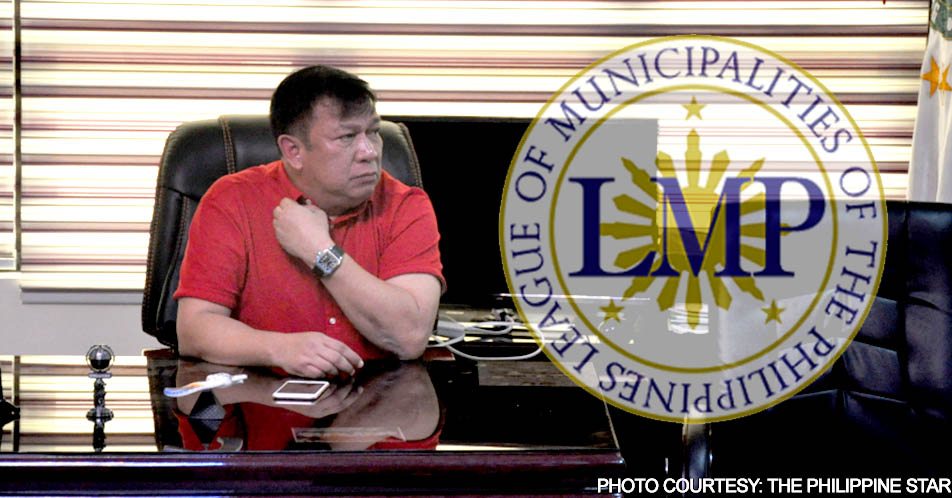Theme:
We Make Change Work For Women
Thursday, March 1, 2018 to Saturday, March 31, 2018

Downloads:
BACKGROUND
The National Women’s Month Celebration every March is part of the worldwide observance of the International Women’s Day (IWD).
The following issuances serve as legal bases for the annual activity:
- Proclamation No. 224 s. 1988declaring the first week of March each year as Women’s Week and March 8 as Women’s Rights and International Peace Day;
- Proclamation No. 227 s. 1988providing for the observance of the Month of March as Women’s Role in History Month; and
- Republic Act (RA) 6949 s. 1990declaring March 8 of every year as National Women’s Day.
2017-2022 THEME
In 2017, the PCW Board Members and Inter-Agency Technical Working Group identified the NWMC theme “We Make Change Work for Women”, which shall be used from 2017-2022. It highlights the empowerment of women as active contributors to and claimholders of development. This pursuit of development is also anchored on the commitment of “Malasakit at Pagbabago” or True Compassion and Real Change.
ELEMENTS OF THE THEME
- Westands for Women’ Empowerment – empowering women enables them to confidently and meaningfully engage with appropriate institutions to ensure that they contribute to and benefit from development and changes. Thus, women’s empowerment will make the change that we are espousing or any development effort responsive of women’s concerns.
- Make Change Work= MCW = Magna Carta of Women – making change work for women necessitates strengthening the implementation of the MCW at all levels. It means putting in place functional mechanisms as well as implementing and making known to citizens, programs and services that address strategic gender needs of women.
- Change– also means Compassionate and Harmonized Actions and Networks for Gender Equality.
- We / us or “kami / tayo” in Filipino– who is going to pave the way for an enabling environment for women to be empowered? Who is going to ensure that the MCW is implemented at all levels? Who is going to make change work for women? It all of us, in our various capacities whether as government officials and employees, members of the private sector, the academe, non-government organizations, or as private individuals can be partners for a change that is gender-responsive. It emphasizes our collective effort, collaboration and participation to ensure that women will not be left behind in the pursuit of change.
The theme emphasizes that women should be active drivers in bringing about positive changes, and that they should also reap from fruits of development efforts. This can be made possible by empowering women – enabling them to meaningfully engage with other development stakeholders, and by fully implementing the MCW.
OBJECTIVES
Consistent with Proclamation No. 227 s. 1988, the annual conduct of the National Women’s Month Celebration (NWMC) aims to give due recognition to the contributions of Filipino women in our society.
Specifically, 2018 celebration aims to:
- inform and engagewomen as stakeholders of government programs and services – to promote citizen-centric governance and make “change” a conscious effort to know, understand, and provide what ALL citizens need;
- create and facilitateplatforms to discuss good practices, gaps, challenges , and commitments in pursuing gender and development (GAD) – to strengthen implementation of the Magna Carta of Women; and
- inspire and empower womenand girls to be agents of change – to contribute in promoting gender equality and the empowerment of all women.
ACTIVITIES
Informing and engaging women as stakeholders of government programs and services
- PRODUCTION AND DISTRIBUTION OF IEC MATERIALS (January to March 2018) – Section 26 of the Magna Carta of Women (Right to Information) also provides that “Access to information regarding policies on women, including programs, projects, and funding outlays that affect them, shall be ensured.” Interestingly, the Agenda Ni Juana Crowdsourcing survey during the 2016 Women’s Month show that the top 5 priority women’s agenda that people expect from the government is “Improved information dissemination on government programs and services for realizing gender equality and the empowerment of all women and girls and their human rights” (chosen among the top five priority of 3,297 out of 8,005 survey participants).
In view of this mandate and the citizen’s expressed need for information, government agencies and LGUs are encouraged to produce and distribute their own information materials featuring their GAD programs and services that can be accessed by women stakeholders. Under the banner/theme “WE Make Change Work for Women”, agency/LGU IEC materials shall respond to the following key points:
- How does the agency/LGU make change work for women?
- What are the programs and services that can be accessed by women clients? Simplified steps/guide in accessing said programs and services.
- Results or most recent data on accomplishments (to showcase how citizens were able to benefit from the program).
Agencies and LGUs can follow their respective office’s branding or style guides in the development of their IEC materials, as long as these key points are presented. The IEC materials may be in the form of flyers, posters, comics, magazine/newsletter, printed materials, audio / video materials, or other format which they deem appropriate and economical. They may also opt to utilize various methods for dissemination such as through information caravan or tapping the broadcast, print and online media. It is also best to prepare the IEC in local languages or pop-version.
Tip for GAD Focal Point Systems: this is the time to make your agency GAD initiatives widely known! The key objective is for the government to address the demand for more information about their programs and services which is also consistent with the mandate for women’s right to information under the MCW.
- SERBISYO PARA KAY JUANA (March 8 or per discretion of sponsoring agency)– The activity enjoins agencies, LGUs and other organizations that offer direct services and other transactions with the public to offer treats like freebies, discounts, or distribution of IEC materials on March 8 which is the International Women’s Day (IWD) and any chosen dates within March, making the celebration more publicly known and felt.
Participating agencies/LGUs are also requested to send the following information about their IWD treats through the comments link below this webpage:
- Agency / LGU Name:
- IWD Treat:
- Date/s and time/s of availability:
- Venue (where to avail):
- Mechanics (how to avail):
- Contact details in case of public queries about the IWD treat:
- NATIONAL WOMEN’S MONTH PHOTO AND POSTER-MAKING CONTEST (March 1-31) – PCW, in partnership with the Philippine Charity Sweepstakes Office (PCSO), will launch the 2018 NWMC Photo and Poster-making contest in march. The activity will utilize arts, particularly photography and poster-making to promote women’s empowerment. The photo contest is open to all college students while the poster-making is open to all high school students. Full mechanics shall be released in March.
Creating and facilitating platforms to discuss good practices, gaps, challenges, and commitments in pursuing GAD
- ANNOUNCEMENT OF NATIONAL WOMEN’S MONTH CELEBRATION (NWMC) IN FLAG RAISING CEREMONY (February 26) – All government agencies and LGUs are encouraged to include NWMC announcement in their respective Flag Raising Ceremonies on February 26 which is the Monday before the start of Women’s Month. The objective of this activity is to enjoin agency/LGU officials and employees to join the national celebration. It will also give the GAD Focal Point Systems the opportunity to explain the objectives, theme and various ways for their colleagues to contribute in achieving the objectives of the national celebration.
You may use the All-Women Cast Lupang Hinirang Video during your Flag Raising Ceremony and agency’s NWMC activities. The music video can be downloaded at http://tiny.cc/allwomenlupanghinirang
Tip for GAD Focal Point Systems: this is the time to highlight GAD within your agency and enjoin the agency officials and employees to support the GAD initiatives that you are working on.
- CERTIFICATION OF GAD LOCAL LEARNING HUBS– PCW will also conduct the formal rites for the certification of Local Learning Hubs on Gender and Development (GAD) during month. The certification of GAD Local Learning Hub (LLH) is designed to institutionalize the sharing and replication of LGUs notable experiences and practices on gender mainstreaming.
Inspire and empower women and girls to be agents of change
- WOMEN INSPIRING WOMEN SERIES (March 8, 15, 22) – First initiated in 2017, the three-part series aims to celebrate women’s journey by sharing inspiring stories of change in their chosen fields to encourage their fellow women to be empowered change agents. Modeled after TEDx format, it will also serve as a venue for women to inspire and appreciate each other, and create an environment supportive of each other. The forum will run as a three-part series to be conducted in Luzon, Visayas, and Mindanao. Target participants are local government units, non-government and people’s organizations, private sector, and students. Interested organizations can also host similar fora following the mechanics and guidelines to be set by PCW.
Dates and Venues:
March 8 – GSIS Theatre, Pasay City, 1:00 – 5:00 PM (For Luzon-based participants)
|
This is intended for participants based in the island group of Luzon. For interested participants, kindly register at https://tinyurl.com/WomenInspiringWomenSeriesLuzon |
March 15 – Aklan Training Center, Kalibo, Aklan, 1:00 – 5:00 PM (For Visayas-based participants)
|
This is intended for participants based in the island group of Visayas. For interested participants, please coordinate with Engr. Roger Esto at Tel. No.: (036) 268-5442 or (036) 262-1555; Email addresses: ppdoaklan@gmail.com, or aklanpgo@yahoo.com. |
March 22 – University of Southeastern Philippines, 1:00 – 5:00 PM (For Mindanao-based participants)
|
This is intended for participants based in the island group of Mindanao. For interested LGUs, NGAs and NGOs, please coordinate with Ms. Lorna Mandin of Davao City IGDD at Tel. No.: (082) 225-0363; Cp. No.: 0917-546-0823 and email addres: igdd@davaocity.gov.ph.
For state universities and colleges, please coordinate with Ms. Rioliza B. Molina of the University of Southeastern Philippines at Cp. No.: 0917-315-8293; Email address: rio.molina@usep.edu.ph |
Important note: these events have limited seats. Separate guidelines on participation shall be released by PCW and partner organizations once logistical details are finalized (e.g. seating capacity of venue, confirmed speakers, etc.).
Tip for GAD Focal Point Systems: You may consider organizing your own Women Inspiring Women Fora, giving special focus on topics relevant to your agency mandate. For example, schools can invite speakers who can inspire young women and girls to excel and explore future career options. Agencies with mandate related to women’s economic empowerment can organize a forum targeting women entrepreneurs. Agencies that deal with traditionally male-dominated fields like science and technology, engineering, mathematics, law enforcement and military, and the likes may consider organizing a gathering of women in the said fields to share their inspiring stories of change. LGUs may host a forum among women’s organizations in the locality to discuss topics relevant for women in the locality, and avenues for engagement and collaboration at the local level.
Agencies/LGUs organizing their own Women Inspiring Women event are also requested to send the following information through the comments link below this webpage for inclusion in the NWMC Calendar of events:
- Host Agency / LGU Name:
- Event Title:
- Date and time:
- Venue (exact location):
- Expected speakers and topics to be discussed:
- Contact details in case of public queries:
- ONLINE ADVOCACY: #JuanaSays (March 1-31) – First initiated by PCW in 2015, Juana Says is a daily dose of inspirational quotes of Filipino women from different fields or profession. Personalities who will be invited to share their inspiring words include heads of government agencies, private corporations/companies, celebrities and artists, women from various sectors (e.g. rural, IP, Moro, youth, formal employment, entrepreneurs), among others.
Everyone in encouraged to visit, like and share PCW’s official social media accounts (Facebook and Twitter) to participate in this online advocacy.
- 2018 CINE JUANA FILM FESTIVAL – Using arts (through film) to showcase and celebrate women’s empowerment and the various role that Filipino women play in the society is the main objective of the Cine Juana Film Festival. Launched in December 2015 during the 18-Day Campaign to End Violence Against Women (VAW), the first Cine Juana Film Festival was opened to the public for free at the NCCA Auditorium in Intramuros, Manila. It showcased films that deal with the issue of VAW, followed by an open forum with the movie producers/artists and PCW representatives per film showing. This year, the Film Development Council of the Philippines is organizing the CineJuana Film Festival, featuring films celebrating women’s strength, power and resiliency which will happen on March 26-28 at Cinematheque Centre Manila.
Click here for the lineup of films and screening schedule. To reserve seats, kindly email cinematheque@fdcp.ph.
Agencies and LGUs may also organize their own film showing, provided that their respective GAD Focal Point systems were able to screen the films to ensure that featured films tackle women’s empowerment, gender equality, or issues confronting women in the marginalized and vulnerable sectors.
- CCP’s READATHON AND PEEK-A-BOOK EXHIBIT – The Cultural Center of the Philippines (CCP) is holding “readathon”, a gathering of women playwrights, which features dramatic readings, workshops for women playwrights and talks on writing for the stage on March 23-24. The CCP is likewise holding an art exhibit featuring the works and books of 12 all-women, all-Filipino illustrators for children on March 24 at the Pasilyo Edades Hallway, 4th floor CCP Building, Roxas Boulevard, Pasay City. For more information, contact Ms. Marivic Santos of the CCP Training and Development Division.
- PURPLE THURSDAYS – The activity encourages women and girls as well as advocate of women’s rights to wear purple or purple accessories or accents like button pins, scarves, wristbands, or ribbons to join the call to advance women’s rights and gender equality, to break gender stereotypes, to stop gender-based violence and discrimination against women. (Concept Note of Purple Thursdays can be found in the Download Section of this page)
Republic Act 9710
Magna Carta of Women
Files:
The MCW is a comprehensive women’s human rights law that seeks to eliminate discrimination through the recognition, protection, fulfilment and promotion of the rights of Filipino women, especially those belonging in the marginalized sectors of the society. It conveys a framework of rights for women based directly on international law.
The MCW establishes the Philippine government’s pledge of commitment to the Convention on the Elimination of All Forms of Discrimination against Women’s (CEDAW) Committee in its 36th Session in 2006 and to the UN Human Rights Council on its first Universal Periodic Review in 2009. It is the local translation of the provisions of the CEDAW, particularly in defining gender discrimination, state obligations, substantive equality, and temporary special measures. It also recognizes human rights guaranteed by the international Covenant on Economic, Social and Cultural Rights (ICESCR).
Salient features of the law include:
- Increasing the number of women in third level positions in government to achieve a fifty-fifty (50-50) gender balance within the next five years while the composition of women in all levels of development planning and program implementation will be at least 40 percent;
- Leave benefits of two (2) months with full pay based on gross monthly compensation for women employees who undergo surgery caused by gynecological disorders, provided that they have rendered continuous aggregate employment service of at least six (6) months for the last twelve (12) months;
- Non-discrimination in employment in the field of military, police and other similar services that include according the same promotional privileges and opportunities as their men counterpart, including pay increases, additional benefits, and awards, based on competency and quality of performance.
- Provision for equal access and elimination of discrimination in education, scholarships, and training. Thus, “expulsion, non-readmission, prohibiting enrollment, and other related discrimination of women students and faculty due to pregnancy out of marriage shall be outlawed.
- Non-discriminatory and non-derogatory portrayal of women in media and film to raise the consciousness of the general public in recognizing the dignity of women and the role and contribution of women in family, community, and the society through the strategic use of mass media;
- Equal status given to men and women on the titling of the land and issuance of stewardship contracts and patents.
In addition to guaranteeing substantive rights, the MCW establishes the responsibility of the government to take actions in order to end discrimination against women. It provides that the Philippines government must “ensure the substantive equality of men and women” and mandates the State to take steps to review, amend or repeal existing laws that are discriminatory towards women.
The Government, in its entirety, shall fulfill these duties through the development and implementation of laws, policies, regulatory instruments, administrative guidelines, and other appropriate measures. It shall also establish mechanisms to promote the coherent and integrated implementation of the MCW and other related laws and policies to effectively stop discrimination against Filipino women.
The MCW mandates all government offices, including government-owned and controlled corporations and local government units to adopt gender mainstreaming as a strategy for implementing the law and attaining its objectives. It also mandates (a) planning, budgeting, monitoring and evaluation for gender and development, (b) the creation and/or strengthening of gender and development focal points, and (c) the generation and maintenance of gender statistics and sex-disaggregated databases to aid in planning, programming and policy formulation.




